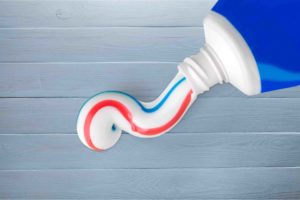 If you’re motivated to maintain a healthy smile and stay cavity-free, chances are that you see a dentist regularly and do well with your brushing habits. And when you put in the time and effort to brush, you may as well get all the benefits you can! Technique is certainly important, but so is the type of toothpaste you use. The only problem is that there are so many options out there that it can be overwhelming to pick the best one. Keep reading below to learn about the general benefits of toothpaste and which type is right for you!
If you’re motivated to maintain a healthy smile and stay cavity-free, chances are that you see a dentist regularly and do well with your brushing habits. And when you put in the time and effort to brush, you may as well get all the benefits you can! Technique is certainly important, but so is the type of toothpaste you use. The only problem is that there are so many options out there that it can be overwhelming to pick the best one. Keep reading below to learn about the general benefits of toothpaste and which type is right for you!
How Does Toothpaste Benefit You?
The main benefit of a fluoride toothpaste is cavity prevention. This naturally occurring mineral helps your teeth the same way calcium helps your bones and prevents cavities by strengthening the enamel. Fortunately, most toothpastes already contain fluoride but, if in doubt, it never hurts to check the label.
In addition to cavity prevention, other benefits of toothpaste include polishing the teeth and making it easier for your toothbrush bristles to remove plaque, bacteria, and stains. It also freshens your breath and can help counteract dry mouth.
Which Toothpaste Is Right For You?
This may seem obvious, but the best toothpaste for you depends on your needs. Start by asking yourself if you have any specific oral health problems or ask your dentist for recommendations at your next checkup. Here are some common needs that can be addressed with the right toothpaste:
- Being cavity-prone – If you seem to have cavities every time you get a checkup, your dentist can give you a prescription-strength fluoride toothpaste that can really help.
- Sensitivity – With ingredients like potassium nitrate and extra fluoride, these formulas can significantly reduce sensitivity. However, it may take several weeks to see a difference.
- Whitening – Whitening toothpastes have more abrasive ingredients to polish the teeth and remove stains from things like coffee, tea, and red wine.
- Dry Mouth – This common condition is not only uncomfortable but also greatly increases the risk of cavities. These formulas keep the mouth moisturized and help prevent tooth decay.
- Natural – If you have allergies to synthetic ingredients or simply prefer a more natural product, these formulas may be a good option (just make sure they still contain fluoride).
The foundation of good oral hygiene is brushing (and flossing, but that’s a topic for another blog!) With this information, you can choose the right product to take care of your smile for years to come.
About the Author
Dr. Chris Long has been practicing dentistry for over 15 years and knows that better oral hygiene at home leads to less dental work overall. That’s why he and his staff always provide tips to empower their patients with the information they need to have a healthy smile. If you have any questions about oral hygiene products, you can reach him via his website.
